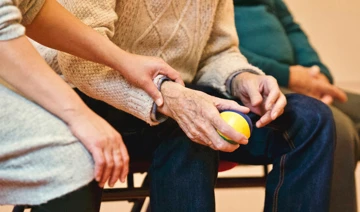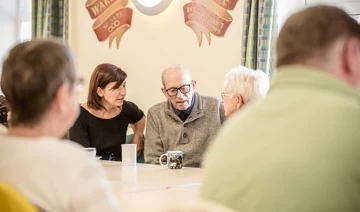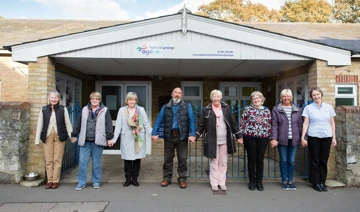Frequently asked questions
Read some frequently asked questions and answers about our community mental health services for older people, and our dementia services.
KMPT operates a Community Mental Health Service both for older people (aged 65+) with mental health needs, which are complicated by age related needs, and for people of all ages, who have needs related to dementia.
The service also provides support and advice to professionals, care homes and carers.
Further information about the KMPT Community Mental Health Service for Older People can be found here.
KMPT has various locations across Kent and Medway where the Community Mental Health Service for Older People operates. In your appointment letter, you will receive details about where your appointment will take place, including a map. Further details about all our CMHSOP locations can be found here.
Developed by Kent and Medway clinicians, the Enhanced Memory Assessment and Intervention Service is available to people with concerns about their memory who are referred by their GP or other healthcare professional.
Instead of needing to attend two appointments, where appropriate, a combined assessment and diagnosis appointment will be offered, taking place on one day at a Memory Service clinic near you.
There are a number of key benefits with the service:
- Single appointment for assessment and diagnosis
- Reduction in time to treatment and support
- Face to face consultation
Opportunity to get answers to questions straight away.
Instead of you needing to attend two appointments, where appropriate, a combined assessment and diagnosis appointment will be offered, taking place on one day at a Memory Service clinic near you.
When you receive your memory assessment appointment letter, we will also issue you with a ‘Memory Handbook’ that provides further information about the service, along with some useful contacts for local services that may also help you.
Dementia is not a mental illness but does affect mental health and it’s a disorder of the brain that can cause memory loss and communication difficulties.
KMPT operates a Community Mental Health Service both for older people with mental health needs, which are complicated by age related needs, and for people of all ages, who have needs related to dementia.
You will be sent an appointment letter by post/email when we have booked an appointment for you with our Community Mental Health Service for Older People. The appointment letter will detail the date, time and location of the appointment and any other important instructions, such as to bring a family member/carer/loved one with you to the appointment.
We always aim to offer appointments at a convenient time for you. If you need to change the date or time of your appointment, please contact the team using the either by telephone or email details on your letter, and we will liaise with those involved in your care to offer an alternative appointment for you.
Each appointment varies, depending on an individual’s needs. On average an initial consultation appointment will last for approximately two hours.
You will be sent an appointment letter by post/email when we have booked an appointment for you with our Community Mental Health Service for Older People. The appointment letter will detail the date, time and location of the appointment and information about parking facilities. Further information about parking facilities at all of our sites can be found here.
You receive a combined assessment and diagnosis, which takes place in the same appointment, after which a plan will be made in collaboration with you and your healthcare team as to what the next steps might be. This may involve further appointments with health care professionals, invitations to specialist groups, therapy and neuropsychological assessments. The KMPT team includes consultant psychiatrists, community psychiatric nurses, occupational therapists, psychological services and support staff, Admiral nurses (specialist dementia nurses) and administrative staff.
If a diagnosis is given, a plan will be made in collaboration with you and your healthcare team as to what the next steps might be. This may involve medication, further appointments with health care professionals, invitations to specialist groups, therapy and neuropsychological assessments.
Yes – we actively encourage you to bring a family member/carer/loved one with you to the appointment, to help support you and raise any questions they may have about your needs.
If you wear glasses or have use of a hearing aid, please bring these with you to your appointment, and any walking aids if needed.
You will be seen initially by a community psychiatric nurse or an occupational therapist and then by the consultant psychiatrist to receive your diagnosis. We always aim for continuity of care and for you to remain with the same consultant and team to support you. There may be occasions, such as annual leave or sickness, when we need to book your appointment with another member of the team.
We do encourage you to have a brain scan – this may be requested by the CMHSOP when we receive your referral. Computerised Tomography (CT) and Magnetic Resonance Imaging (MRI) scans are used to acquire detailed images of the brain and can indicate whether people are developing different types of dementia, and reveal how people are responding to treatments.
Your scan appointment usually takes up to one hour – this will be a CT or MRI scan depending on an individual’s needs. The MRI scanner makes loud noises as it acquires the images so ear-plugs or headphones are usually worn (this is not the case for CT scans). Because the MRI scanner uses a strong magnetic field you’ll be asked to remove any metal, and you will be asked whether you have any metal in your body before having the scan. Sometimes you will be asked to change into a gown or pyjamas, but other times you can wear your own clothes.
The CT/MRI scan takes place at your local acute hospital (for example, Maidstone Hospital, Medway Maritime Hospital, Tunbridge Wells Hospital, Queen Elizabeth The Queen Mother Hospital, William Harvey Hospital).
Following your CT/MRI scan appointment, we aim to feedback results within a 12-week period. We are working hard to reduce the feedback turnaround time to a 6-week period.
Dementia is a group of symptoms and it is caused by different diseases that damage the brain. The symptoms get worse over time and include:
- memory loss
- confusion and needing help with daily tasks
- problems with language and understanding
- changes in behaviour.
Dementia is progressive, which means symptoms may be relatively mild at first, but they get worse over time. There are many types of dementia but Alzheimer’s disease is the most common. The next most common is vascular dementia.
Further information can be found here: About dementia - NHS (www.nhs.uk)
If you are diagnosed with dementia and want to keep driving, the first step is to tell DVLA about your diagnosis straightaway, if you don’t you could be fined up to £1,000. DVLA will then send you a questionnaire and a request to get medical reports from your doctor. Based on the doctor’s report, medical advisers at DVLA will decide if you can keep driving. Useful information about driving and dementia can be found on Alzheimer’s Society website: How to keep driving after a dementia diagnosis | Alzheimer's Society (alzheimers.org.uk)
There are lots of resources and support groups available to support you live well with dementia.
This Living with Dementia Toolkit is a useful resource as is the Living with dementia: my life, my goals guide
There are lots of support groups available across Kent and Medway for people living with a diagnosis of dementia. Please refer to the list of groups detailed above on this page.
We are always looking for lived experience input to help shape and improve our services. You can get involved with one of our dementia service groups (link to list on website) or join our engagement council
You can also sign up to join dementia research projects. Further information can be found here KMPT | Dementia Studies




